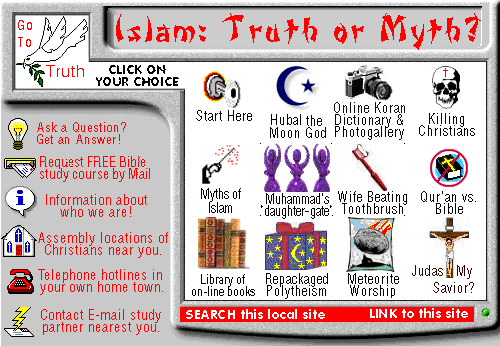
Islam Is Repackaged Polytheism: Documentation
Muhammad: A Western Attempt to Understand Islam, Karen Armstrong, Chapter 6: the Satanic verses, p 108-133, 1991
Muhammad: A Western Attempt to Understand Islam, Karen Armstrong, Chapter 6: the Satanic verses, p 108-133, 1991
Chapter 6 - The Satanic Verses
- The Quraysh were generally a tolerant people, but as soon as Muhammad forbade the cult of the old deities of Arabia a gulf of suspicion and hatred suddenly opened between the Qurayshi majority and the Muslim community. As Ibn Ishaq says: When the apostle openly displayed Islam as God ordered him, his people did not withdraw or turn against him so far as I have heard, until he spoke disparagingly of their gods. When he did that they took great offence and resolved unanimously to treat him as an enemy, except those whom God had protected by Islam from such evil but they were a despised minority. But why were the Quraysh so upset? Some had already moved towards the monotheistic vision by reprding Judaism and Christianity as superior to the old Arab paganism. The cult of the Daughters of God (banat Allah) was mainly confined to shrines at Taif, Nakhlah and Qudayd and must have been marginal to the religious life of mecca. It is true that some of the Quraysh were wary of offending the Bedouin tribes, who had already driven guardian ,tribes of the Ka'aba out of mecca for impiety, but the problem went deeper than this. The Qu'ran shows that all the leading men of the city instinctively banded together against Muhammad and declared him an enemy of the people. no idea that there was only one God was an extraordinary innovation, they exclaimed; the worship of the banat d-Liah was a sacred duty, binding upon all the people of Arabia.
- In the West, some scholars have assumed that this refers to the now notorious incident of the so-called 'Satanic Verses' when, they say, Muhammad had made a temporary concession to polytheism.
- The story, as it appears in the histories of Ibn Sa'd and Tabari, says that on one occasion Satan interfered with Muhammad's reception of the divine Word. While Sura 53 was being revealed, this tradition has it, Muhammad felt inspired to utter two verses which declared that the three goddesses al-Lat, al-Uzza and Manat could be revered as intermediaries between God and man. But since the Quraysh considered the banat Allah divine beings, they wrongly believed that the Qu'ran had placed them on the same level as God Himself. Thinking that Muhammad had accepted their goddesses as having equal status to Allah, the pagan Qu'raysh bowed down to make the salat with the Muslims and the bitter dispute seemed at an end. Because the Qu'ran appeared to have endorsed the piety of their fathers and to have abandoned its monotheistic message, they no longer saw Islam as a sacrilegious threat that could bring a catastrophe on the people of Mecca. The story goes on, however, that Muhammad later received another revelation which indicated that his apparent acceptance of the cult of the banat Allah had been inspired by 'Satan'. Consequently, the two verses were expunged from the Qu'ran and replaced by others which declared that the three goddesses were figments of the Arabs' imagination and deserved no worship at all.
- Surely any genuine prophet would be able to distinguish between a divine and a satanic inspiration? Would a man of God tamper with his revelation merely to attract more converts? Recently, however, scholars like Maxime Rodinson and W. Montgomery Watt have attempted to show that even as the story stands it does not necessarily bear such a negative interpretation. Nevertheless, the incident remained far more important in the Western than in the Islamic world; at least until 1988.
- Was Muhammad ready to compromise his monotheistic message to attract more converts? Was the Qu'ran even momentarily tainted by the influence of absolute evil? In context, we can see that, as Rodinson and Watt have both argued, the story does not present Muhammad as a cynical impostor.
- Accordingly, it is said that Muhammad recited the two verses praising al-Lat, al-Uzza and Manat as valid intercessors, only to realise later that the words had been inspired by 'Satan'.6 But this story is in conflict with other traditions and with the Qu'ran itself. We must remember that a Muslim historian like Tabari does not necessarily endorse all the traditions he records: he expects the reader to compare them with others and to make up his or her own mind about their validity.

Go To Start: WWW.BIBLE.CA
